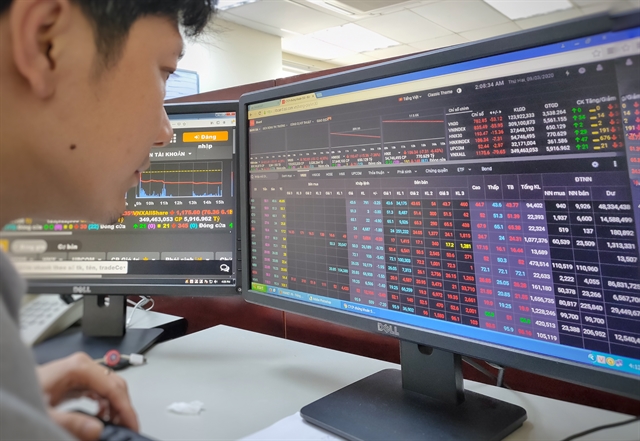Viet Nam’s benchmark VN-Index plummeted 6.28 per cent on Monday, its worst daily loss in the last 19 years, as investors were alarmed with widespread slumps on the global markets.

Viet Nam’s benchmark VN-Index plummeted 6.28 per cent on Monday, its worst daily loss in the last 19 years, to 835.49 points as investors were alarmed with widespread slumps on the global markets.
The slump was so bad that some compared it to a car heading downhill at a rapid rate.
Only 34 shares on the Ho Chi Minh Stock Exchange gained value while 368 declined, of which 173 nose-dived by the daily maximum of 7 per cent. The other 42 closed flat.
Among the top 30 shares by market value and liquidity (VN30), 23 dropped to the floor-price.
A few saw less severe declines such as Eximbank (EIB) and Novaland Investment (NVL) with losses of below 2 per cent but others like Masan Group (MSN), brewer Sabeco (SAB), Vietjet (VJC), sugar maker Thanh Thanh Cong-Bien Hoa (SBT) and Refrigeration Electrical Engineering (REE) slumped by more than 3 per cent.
On the Ha Noi Stock Exchange, the HNX-Index gave up 6.43 per cent to close Monday at 106.34 points.
Both the VN-Index and HNX-Index gained last week.
According to Phan Dung Khanh, head of the investment consultancy at Maybank Kim Eng Securities Co, Monday’s crash was one of three worst trading sessions in the entire history of Viet Nam’s securities market.
However, the magnitude of this crash was far more severe than in the past when the stock market had fewer than 10 shares trading, Khanh said.
Describing the session “frightful”, he said the 31 people infected with the novel coronavirus in Viet Nam together with some areas being put under quarantine have rattled the nerves of investors.
Across the globe, financial markets were on the rocks while the oil prices slashed one third after the collapse of OPEC’s supply cut agreement with Russia.
Shares of local energy companies such as PV Gas (GAS), PetroVietnam Drilling & Wells Service (PVD), PetroVietnam Technical Services (PVS) and Petrolimex (PLX) hit the floor price.
“Panic spread across the globe, not only in Viet Nam,” Khanh said, pointing out the Vietnamese stock market has been on the downtrend since 2018 and the epidemic was just another blow to the market.
He mentioned the risk of mass selling on the market could continue to run wild, especially on the shares being hard hit by margin calls. Total of margin lending by the end of last year reached VND55 trillion (US$2.4 billion), the highest in history, he said.
Liquidity remained at a high level on Monday with 377.6 million shares worth VND7.8 trillion ($336 million) being traded in the two markets, up 24 per cent in volume and 64 per cent in value compared to last week’s daily average. — VNS





